Sufi Urdu poetry is a captivating form of expression that transcends both time and geography. This spiritual kind of poetry, which is profoundly entrenched in the Sufi tradition, has captivated readers for ages. In this post, we will take a deep dive into the wonderful realm of Urdu Sufi poetry, exploring its core and meaning. Join us on this journey as we discover the mystery and enchantment of Sufi poetry.
 poetry in urdu funny
poetry in urdu funny
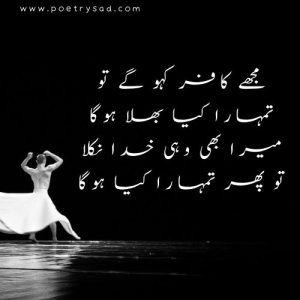 poetry in urdu ghalib
poetry in urdu ghalib
Q1: What is a Sufi in Islam?
Ans: A Sufi in Islam is a follower of Sufism, a mystical and contemplative branch of Islam. Sufis seek a direct, intimate encounter with the divine, emphasizing inward spiritual growth and a close relationship with Allah. They seek spiritual intimacy and knowledge through activities such as dhikr (remembrance of God), meditation, and Sufi poetry. Sufism goes beyond rigid legalism and focuses on the heart’s connection to God. Sufis frequently follow the teachings of a spiritual leader (a Sufi master or sheikh), emphasizing love, compassion, and humility in their pursuit of heavenly knowledge, with the goal of spiritual enlightenment and connection with the divine.
 sad poetry in urdu text copy paste
sad poetry in urdu text copy paste
 sad poetry in urdu
sad poetry in urdu
 shayari urdu friendship
shayari urdu friendship
Q2. What do Sufis believe?
Ans: Sufis, who practice Sufism in Islam, seek a direct and intimate connection with the divine, emphasizing Islam’s inner, mystical components. Tawhid (God’s oneness) is a core belief that acknowledges Allah as the ultimate truth. Sufis value spiritual love (ishq) and devotion in their pursuit of God. They believe that spiritual activities such as dhikr (God’s remembrance), meditation, and Sufi music (qawwali) can alter lives. Sufis frequently follow the teachings of a spiritual leader (sheikh) and focus on cleaning the heart, aiming for humility, compassion, and love as they journey toward spiritual enlightenment.
 shayari urdu ghazal
shayari urdu ghazal
 urdu poetry by allama iqbal
urdu poetry by allama iqbal
Q3: Was the Prophet Muhammad a Sufi?
Ans: The term “Sufi,” as we know it now, did not exist during the Prophet Muhammad’s lifetime. Sufism emerged centuries after his death. Sufis saw the Prophet as the highest example of spiritual perfection, highlighting his compassion, humility, and devotion to God. While the Prophet Muhammad may not have been identified historically as a Sufi, his life and teachings had a tremendous impact on the evolution of Sufism as a mystical and contemplative dimension of Islam.
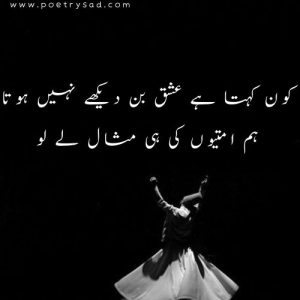 urdu poetry by jaun elia
urdu poetry by jaun elia
 poetry in urdu
poetry in urdu
Q4: Is Pakistan a Sufi country?
Ans: Pakistan is mainly Muslim, and Sufism has had a huge impact on its religious and cultural landscape. Sufi traditions have completely permeated Pakistan’s spiritual and social fabric, despite the fact that Islam is predominantly Sunni with a significant Shia minority. Many Pakistanis, both urban and rural, practice Sufism and worship Sufi saints. Sufi shrines and gatherings are common, and Sufi poetry and music are important forms of religious expression. However, it is important to highlight that Pakistan’s religious landscape is diverse, including numerous Islamic perspectives, and not all Pakistanis identify solely with Sufism.
 urdu poetry
urdu poetry
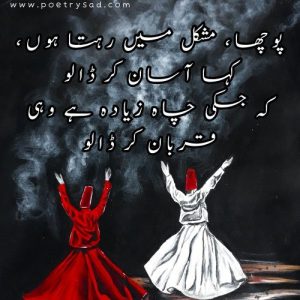 shayari urdu
shayari urdu
Q5. Who was the first Sufi?
Ans: Identifying the “first Sufi” is difficult due to the slow and organic growth of Sufism during the early centuries of Islam. The name “Sufi” was coined subsequently to designate persons who sought deeper spiritual insights and experiences within the Islamic faith.
Hasan al-Basri (d. 728 CE) and Rabia al-Basri (d. 801 CE) are two people who are sometimes cited as early Sufi antecedents or influencers. They were noted for their ascetic lifestyles, intense religiosity, and focus on love and devotion to God. Sufism developed rapidly in the eighth and ninth centuries, with numerous mystics contributing to its evolution. Prominent Sufi groups, such as the Qadiriyya and Naqshbandiyya, developed later, establishing Sufism as a distinct spiritual tradition in Islam.
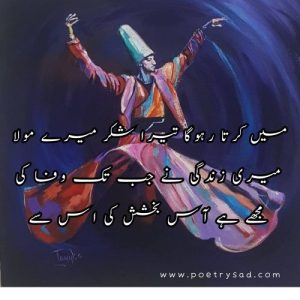 sad poetry urdu
sad poetry urdu
 poetry sad
poetry sad
Q6. What is Sufi poetry?
Ans: Sufi Urdu poetry is a type of writing that combines spirituality, mysticism, and lyrical artistry. It contains the teachings, experiences, and philosophy of Sufism, a mystical Islamic belief system. Sufi poets, also known as “sufis” or “mystics,” use their verses to express profound spiritual truths, frequently using metaphorical language and symbolism to elicit a better knowledge of life’s secrets.
More Related Articles
The Beginnings of Urdu Sufi Poetry
Sufi Urdu poetry has its roots in the rich cultural fabric of the Indian subcontinent. It arose during the medieval period and thrived during the Mughal era. Urdu Sufi poetry, influenced by Persian, Arabic, and Indian poetic traditions, generated a one-of-a-kind combination that remains relevant today.
The poetry of Rumi
Rumi is one of history’s best-known Sufi poets. His poetry is celebrated all throughout the world, regardless of language. Rumi’s lines demonstrate the worldwide attraction of Sufi poetry. They encourage readers to explore the depths of their souls and seek spiritual enlightenment.
Themes of Urdu Sufi Poetry
Sufi poetry explores a wide range of themes, all of which are intertwined with Sufism’s basic ideas. Some of the common themes in this poetry tradition are:
1. Love and Devotion: Love is a common theme in Sufi poetry, representing the soul’s desire for a closer relationship with the holy.
2. Spiritual path: Sufi poets frequently portray the human path toward spiritual awareness and self-realization.
3. Unity and Oneness: The concept of unity with the divine is important, emphasizing the interdependence of all things.
4. Mystical Experiences: Sufi poetry depicts mystical encounters in which the poet connects with the holy and experiences great ecstasy and discoveries.
Sufi poetry and its impact
Urdu Sufi poetry has made a lasting impact on literature, culture, and spirituality. It is a source of inspiration for individuals seeking deep insight and spiritual enlightenment.
The power of Sufi poetry
Sufi poetry has a unique power: it may reach the darkest recesses of the human heart and elevate the soul. The lyrics have a transforming aspect that moves the reader’s emotions and instills a desire for spiritual progress. Sufi poetry, with its subtle use of metaphors and analogies, contains a wealth of profound wisdom.
The beauty of language.
The language is one of the most captivating characteristics of Urdu Sufi poetry. The poets utilize language in ways that are both captivating and vivid. Their verses create vivid images, encapsulating the essence of spirituality and the human experience.
The essence of Urdu Sufi poetry.
Sufi poetry, with its ageless wisdom, continues to appeal to people from all walks of life. It is a lyrical tradition that brings people together via the language of the heart, crossing linguistic and cultural boundaries.
FAQs:
Q1: What role does Sufi poetry have in contemporary society?
Ans: Sufi poetry remains relevant because it addresses everlasting themes of love, spirituality, and harmony that are common to the human experience.
Q2: Can you recommend any more great Sufi poets?
Ans: In addition to Rumi, renowned Sufi poets include Hafiz, Bulleh Shah, and Amir Khusro.
Q3: How may one begin to appreciate Sufi poetry?
Ans: To appreciate Sufi poetry, begin by reading translations of well-known Sufi poets and entering their mystical universe.
Q4: Is Sufi poetry tied to a specific faith or belief system?
Ans: Sufi poetry transcends theological boundaries, embracing themes of love, spirituality, and harmony that resonate with seekers of all faiths.
Q5: What are the greatest ways to encounter Sufi poetry besides reading?
Ans: Attending Sufi music concerts, visiting Sufi shrines, and discovering Sufi art can provide a comprehensive understanding of this poetic style.
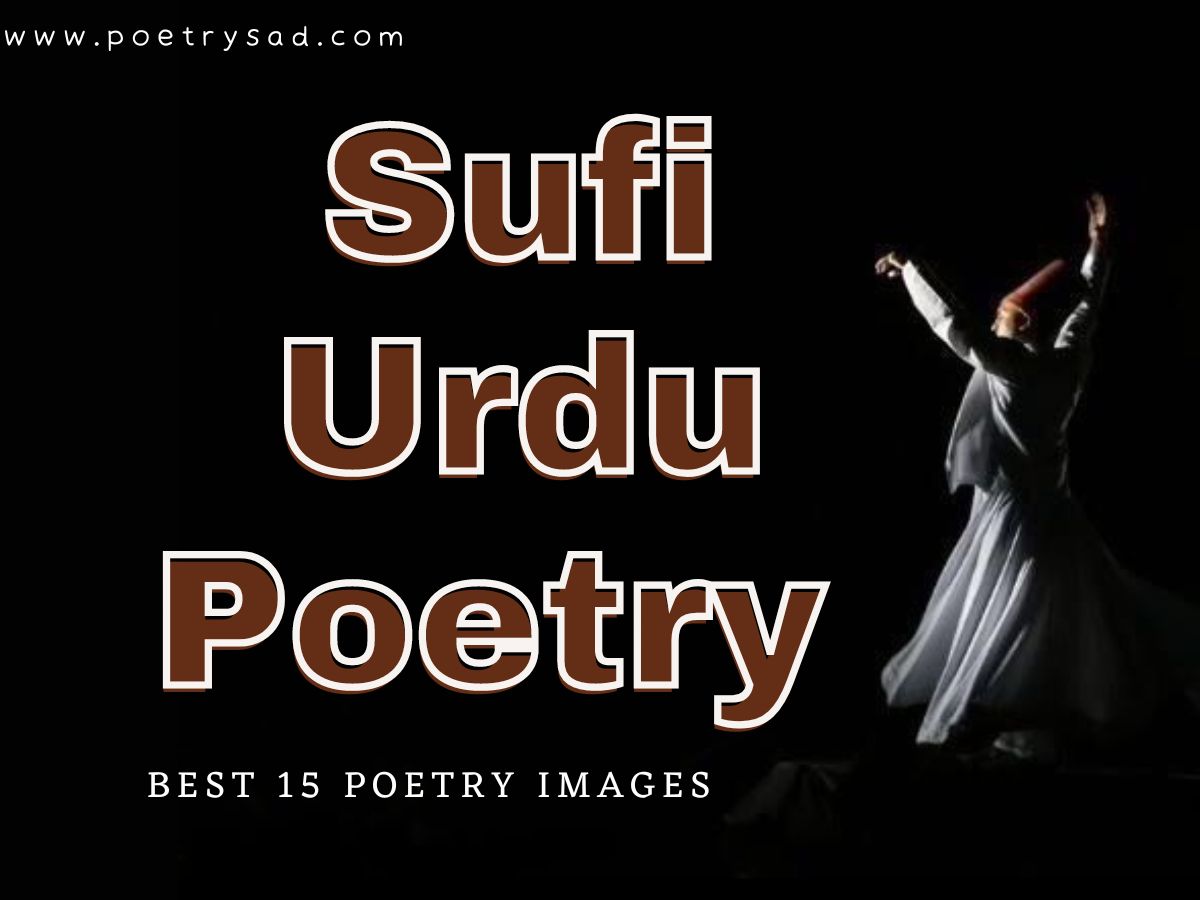
1 thought on “Sufi Urdu Poetry | Poetry In Urdu Text”